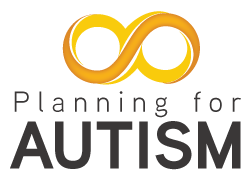Promoting Community Participation for Autistic Learners is a curriculum designed for transition-aged youth and young adults who are autistic or experience similar sensory, communication, and/or social characteristics.
The curriculum took shape over the course of two years with input and perspectives from a variety of professionals, including occupational therapists and speech language pathologists, as well as autistic individuals and adults with intellectual and developmental disabilities. Engaging lessons, relevant themes, and learning objectives within the curriculum are driven by recent research from the fields of occupational therapy, speech-language pathology, mental health, and education.
There are three distinct units within the curriculum:
Unit 1
This unit explores self-awareness for students as it pertains to the way they perceive and interpret sensory information. Lessons target vocabulary related to describing sensory input, practice with noticing patterns about the ways students experience sensations, and increasing the learners’ capacity for insight about their personal sensory needs.
Unit 2
This unit covers self-care and guides students to explore how they can recognize and meet their sensory needs through accommodations, self-regulation, or seeking assistance. Learners discuss and experiment creatively to identify tools that support their participation in educational and community settings.
Unit 3
This unit focuses on self-advocacy and asks learners to consider what they have learned about themselves in earlier parts of the curriculum and make decisions about how and what they want to communicate about themselves to others. Lessons guide learners through decision-making regarding self-disclosures and encourage learners to utilize their insight to advocate for themselves in a variety of settings.
What’s in it for learners?
Understanding
It is impossible to advocate for yourself well in communities if you have limited understanding of what it is you need and why. Promoting Community Participation for Autistic Learners systematically approaches the development of personal insight regarding sensory preferences and experiences, along with practical descriptive vocabulary to support self-advocacy.
Increased Autonomy
All units cover topics that are highly individualized for learners. One approach doesn’t work for everyone, therefore lessons are designed to capture individual needs and preferences, as well as keep an ongoing record of information learned throughout the curriculum.
What’s in it for professionals?
Ease of Adoption
Promoting Community Participation for Autistic Learners is aligned with Texas Essential Knowledge and Skills (TEKS), Common Core State Standards (CCSS), and Texas College and Career Readiness Standards (CCRS) and can be used as a standalone curriculum or can seamlessly complement current transition planning curricula.
Built-In Progress Monitoring
This curriculum is designed to support crucial goals for students and contains observational assessment tools to capture information about students’ progress throughout the units.

